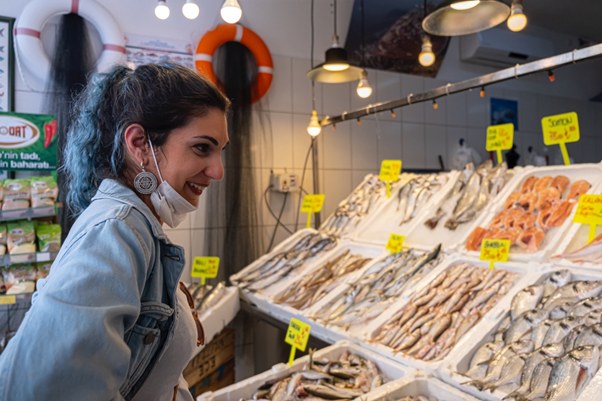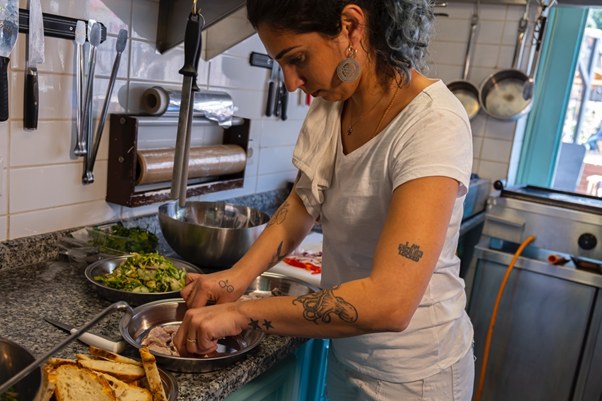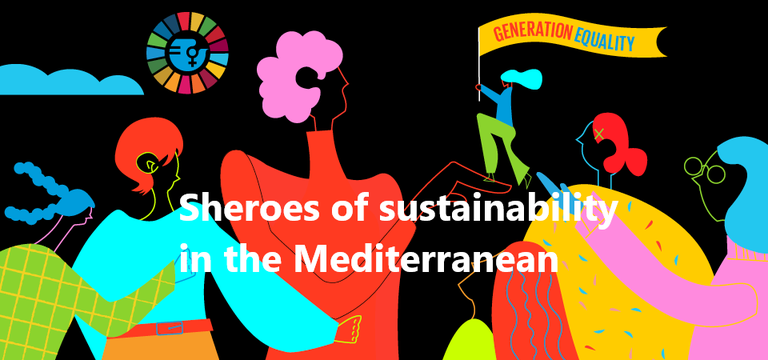MPA-based entrepreneur turns invasive fish species into a local delicacy
Two years ago, Kubra Karadayi Beyoglu and her husband left Istanbul and moved to the seaside town of Kaş where they opened a small restaurant. They cite their fascination with the nature of the Kaş-Kekova MPA as the main reason they settled there.
 As an environmentally friendly woman entrepreneur, Ms. Karadayi Beyoglu, who runs her own restaurant called "Zoka Street Food", uses local, seasonal produce. Her days begin with a morning visit to local fish stalls. Today's purchase is instant menu inspiration. Offering a new menu every day comes with challenges, but the Chef says she enjoys the process. This allowed her to forge links with fishermen and to better understand the tempting wealth of local marine biodiversity.
As an environmentally friendly woman entrepreneur, Ms. Karadayi Beyoglu, who runs her own restaurant called "Zoka Street Food", uses local, seasonal produce. Her days begin with a morning visit to local fish stalls. Today's purchase is instant menu inspiration. Offering a new menu every day comes with challenges, but the Chef says she enjoys the process. This allowed her to forge links with fishermen and to better understand the tempting wealth of local marine biodiversity.
The waters of Kaş-Kekova have recently seen a sharp increase in non-native species (NIS), including lionfish. Although edible, the lionfish was little known to local foodies and had a somewhat creepy reputation. Ms. Karadayi Beyoglu still remembers the first time she was presented with a lionfish: "Don't touch it or you will die," one fisherman told her. "But by doing my own research and learning how to safely clean fish, I realized that it didn't deserve all this dislike."
 In a stroke of culinary genius, the innovative woman entrepreneur turned lionfish into a local delicacy. Several other edible invasive species, including the marbled and dark rabbitfish (picot or sigan) quickly followed the lionfish's route namely from the waters of Kaş-Kekova to Ms. Karadayi Beyoglu's restaurant. “People now come to our restaurant specifically for the invasive species we serve,” she says.
In a stroke of culinary genius, the innovative woman entrepreneur turned lionfish into a local delicacy. Several other edible invasive species, including the marbled and dark rabbitfish (picot or sigan) quickly followed the lionfish's route namely from the waters of Kaş-Kekova to Ms. Karadayi Beyoglu's restaurant. “People now come to our restaurant specifically for the invasive species we serve,” she says.
As a business owner, Kubra understands that her restaurant is part of a local service network, which is why she appreciates working with other restaurateurs, fishermen and farmers. In addition to generating good business, putting non-native fish on the menu relieves endemic species and turns a plague into a boon. But for this to work in the long term, small-scale inshore fishermen must want to target these species.
One of Ms. Karadayi Beyoglu's dreams is to meet like-minded women entrepreneurs from other countries. She also believes that there are many chefs, both male and female, in Turkey who would add lionfish to the menus they offer.
With the restrictions linked to the pandemic, Mrs. Karadayi Beyoglu has started to use social networks to communicate with her customers, but it is not the same thing as welcoming them to her restaurant because according to our chef entrepreneur the invitation “n 'be afraid of the lionfish' at 'a new dining experience' works best with a reassuring smile.
The views expressed do not necessarily represent the decision or the stated policy of the United Nations Environment Programme.

